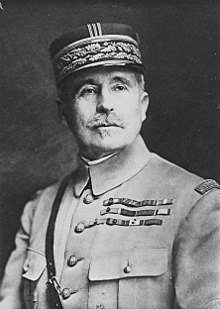Robert Nivelle

Robert Georges Nivelle (15 October 1856 – 22 March 1924) was a French artillery general officer who served in the Boxer Rebellion, and the First World War. Nivelle was a very capable commander and organizer of field artillery at the regimental and divisional levels. In May 1916, he succeeded Philippe Pétain as commander of the French Second Army in the Battle of Verdun, leading counter-offensives that rolled back the German forces in late 1916. During these actions he and General Charles Mangin were already accused of wasting French lives. He gives his name to the Nivelle Offensive.
Following the successes at Verdun, Nivelle was promoted to commander-in-chief of the French armies on the Western Front in December 1916, largely because of his persuasiveness with French and British political leaders, aided by his fluency in English. He was responsible for the Nivelle Offensive at the Chemin des Dames, which had aroused skepticism already in its planning stages. When the costly offensive failed to achieve a breakthrough on the Western Front, a major mutiny occurred, affecting roughly half the French Army, which conducted no further major offensive action for several months. Nivelle was replaced as commander-in-chief by Philippe Pétain in May 1917.
Quotes
[edit]- Ils ne passeront pas! [They shall not pass!]
- Order of the Day during the Battle of Verdun (23 June 1916), quoted in Alistair Horne, The Price of Glory: Verdun 1916 (1962, 1993), p. 231 and Ian Ousby, The Road to Verdun: France, Nationalism and the First World War (2002), p. 231
Quotes about Nivelle
[edit]- Good impression; clear eyes which look you in the face, neat and precise thoughts, no bluff in his speech, good sense dominates everything.
- Abel Ferry, quoted in Alistair Horne, The Price of Glory: Verdun 1916 (1962, 1993), p. 231
- Meteor-like, his orbit was swift and brilliant; also like a meteor, he was to disappear without trace. In the rapidity of his early promotion he resembled Pétain, but no further. He was an out-and-out Grandmaisonite, and like Foch he believed that victory was purely a matter of moral force. ... [T]he supreme attribute of Nivelle—cultured, courteous, suave and eloquent—was his ability to handle the politicians. His allure seems to have been almost hypnotic.
- Alistair Horne, The Price of Glory: Verdun 1916 (1962, 1993), pp. 230-231
- Here is a chief in the Latin sense of the word, that is to say une tête ... confident hope rings a carillon of bells in our hearts.
- L'Illustration, quoted in Alistair Horne, The Price of Glory: Verdun 1916 (1962, 1993), p. 318
- [Nivelle was] not only a rash commander, he was representative of the national temperament. This is the reason that he was blindly followed.
- Jean de Pierrefeu, quoted in Alistair Horne, The Price of Glory: Verdun 1916 (1962, 1993), p. 320

